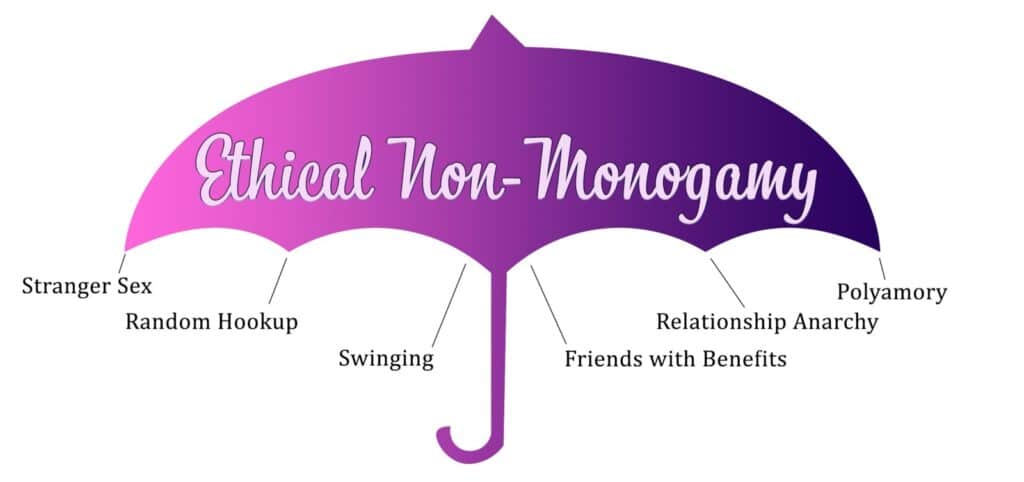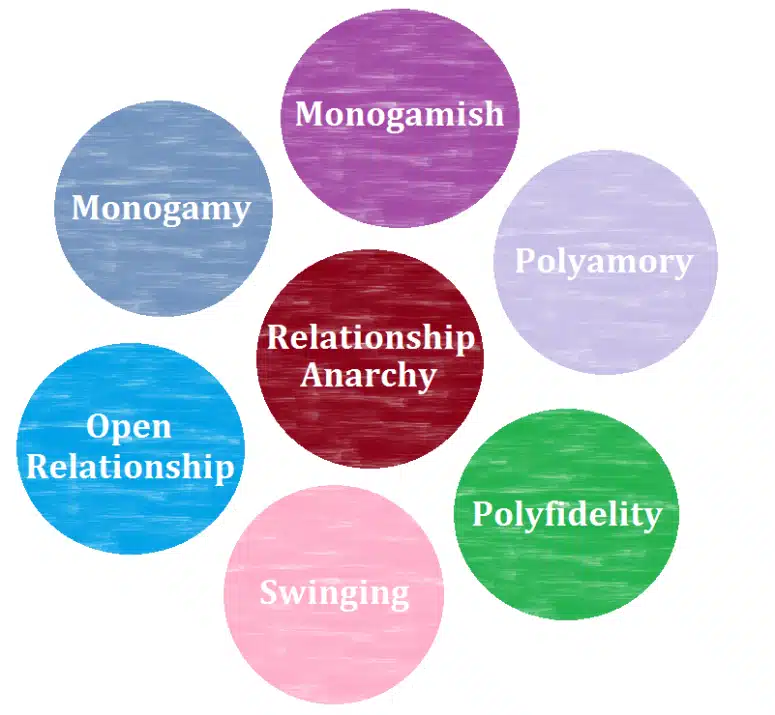What is ENM? Ethical Non-Monogamy is at the forefront of this cultural evolution, sparking curiosity and debate as it redefines the boundaries of human relationships.
In matters of love, relationships, and human connection, societal norms have often dictated a strict adherence to monogamy as the accepted standard. However, as the world evolves and perspectives shift, alternative relationship structures are emerging from the shadows, challenging conventional beliefs and offering a fresh approach to intimacy.
Unlike the traditional model of exclusive monogamy, where romantic and sexual partnerships are limited to a single individual, ENM encompasses a diverse range of relationship styles that prioritize transparency, communication, and mutual consent among all involved parties.
From polyamory and open relationships to swinging and relationship anarchy, the myriad forms of ENM offer individuals the freedom to customize their love lives in accordance with their personal values and desires.

While the concept of non-monogamy is not new, the emphasis on ethics distinguishes ENM from its historical predecessors, emphasizing the importance of honesty, respect, and consent to navigate these complex relationship dynamics.
As the movement gains momentum and garners public attention, questions abound about the practicalities, emotional complexities, and societal implications of embracing non-traditional forms of love.
Read Also: What is Citizenship Education?
What is ENM?
ENM stands for “Ethical Non-Monogamy,” which refers to a broad category of consensual relationship structures that allow individuals to have multiple romantic or sexual partners simultaneously, with the knowledge and agreement of all involved parties.
Unlike traditional monogamous relationships, where exclusivity is the norm and partners are committed to only one another, ENM challenges the societal norms surrounding love, intimacy, and commitment.

In Ethical Non-Monogamous relationships, transparency, open communication, and informed consent are paramount. All partners involved are aware of and consent to the arrangement, ensuring that everyone’s needs, boundaries, and desires are respected. The foundation of ENM lies in the ethical treatment of all parties involved.
Various Forms of Ethical Non-Monogamy
Ethical Non-Monogamy encompasses several different relationship structures, each with its own unique characteristics and dynamics. Here are some of the various forms of Ethical Non-Monogamy:

- Polyamory: Polyamory involves having multiple consensual, emotional, and often romantic relationships simultaneously. The individuals in these relationships may love and form deep connections with multiple partners, and all partners are aware of and consent to the arrangement.
- Open Relationship: In an open relationship, partners agree that they can have sexual relationships with others outside of their primary partnership. The focus is primarily on maintaining the primary relationship while allowing for sexual exploration and encounters with others.
- Swinging: Swinging involves couples or individuals engaging in consensual, non-emotional sexual activities with others. It often takes place in group settings, such as parties or clubs, where like-minded individuals come together for sexual experiences without forming romantic attachments.
- Relationship Anarchy: Relationship Anarchy challenges traditional hierarchical relationship structures. In this approach, all connections are considered equal, and individuals define the boundaries and commitments of their relationships based on their personal desires and needs. There are no pre-defined roles or expectations.
- Solo Polyamory: Solo polyamory is a form of polyamory where individuals maintain multiple intimate relationships but choose to remain independent and not pursue a primary partnership or live with any one partner. Autonomy and personal growth are highly valued in solo polyamorous relationships.
- Triad or Quad: A triad involves three people in a consensual relationship, and a quad involves four people. In these configurations, all individuals may have emotional and/or sexual connections with each other, creating a complex network of relationships.
- Kitchen Table Polyamory: Kitchen Table Polyamory refers to a form of polyamory where all partners are comfortable and communicative enough to sit together at a metaphorical “kitchen table.” It emphasizes open communication and harmonious coexistence among partners, fostering a sense of community and interconnectedness.
- Hierarchical Polyamory: Hierarchical polyamory involves having multiple relationships with varying levels of commitment and priority. One partnership may be considered primary, while others are secondary or tertiary, with different levels of time and emotional investment.
It’s important to note that each of these forms of Ethical Non-Monogamy has its own set of challenges, benefits, and guidelines. What works for one person or group may not work for another, and clear communication and respect for all partners’ boundaries are crucial in any Ethical Non-Monogamous relationship.
See Also: Is it Normal for my Boyfriend to Hit Me?
The Principles and Values Behind Ethical Non-Monogamous Relationships
Ethical Non-Monogamous relationships are founded on a set of principles and values that prioritize open communication, honesty, consent, and respect for all parties involved. These principles guide the dynamics and boundaries within the relationships and ensure that all individuals’ needs and desires are considered.
Here are the key principles and values behind Ethical Non-Monogamous relationships:
- Consent: The cornerstone of Ethical Non-Monogamy is informed consent. All individuals involved must willingly and knowingly agree to participate in the relationship structure. Consent is ongoing and can be revisited and renegotiated as circumstances change.
- Communication: Open and honest communication is essential in Ethical Non-Monogamous relationships. Partners share their feelings, desires, and boundaries openly, fostering a culture of trust and understanding. Regular check-ins and discussions are encouraged to address concerns and ensure everyone’s emotional well-being.
- Respect: Respect for each individual’s autonomy and agency is a fundamental value in Ethical Non-Monogamous relationships. This includes respecting personal boundaries, feelings, and choices, as well as honouring the agreements made within the relationship.
- Trust: Building and maintaining trust is vital in any relationship, but it becomes even more crucial in Ethical Non-Monogamous relationships due to the complexity of multiple connections. Trust is nurtured through honest communication, consistent actions, and honouring commitments.
- Compersion: Compersion is a term used in Ethical Non-Monogamous relationships to describe the positive feeling of joy and happiness experienced when one’s partner finds happiness or emotional fulfilment with another person. It involves celebrating the love and connections your partner experiences with others.
- Jealousy Management: Ethical Non-Monogamous relationships acknowledge that jealousy is a natural human emotion. Instead of trying to eliminate jealousy altogether, partners work together to manage and understand these feelings through communication, self-reflection, and emotional support.
- Personal Growth: Ethical Non-Monogamy often encourages personal growth and self-awareness. Engaging in multiple relationships can lead to self-discovery, introspection, and a deeper understanding of one’s emotions and needs.
- Non-Possessiveness: In Ethical Non-Monogamous relationships, partners recognize that love and connections are not limited resources to be possessed or controlled. Instead, they value individual freedom and autonomy, allowing each person to explore relationships that align with their desires.
- Relationship Customization: Ethical Non-Monogamous relationships reject the notion of a one-size-fits-all approach to love and commitment. Instead, they allow individuals to tailor their relationships according to their unique needs and preferences.
- Ethical Considerations: Ethical Non-Monogamous relationships prioritize ethical behaviour and reject dishonesty, cheating, or manipulation. All partners are expected to act with integrity and empathy towards each other.
By embracing these principles and values, Ethical Non-Monogamous relationships aim to create a framework that fosters healthy, fulfilling, and consensual connections, challenging traditional notions of monogamy and offering a more diverse approach to love and intimacy.
Related: SLS Lifestyle: Everything you need to Know
Benefits of ENM
Ethical Non-Monogamy (ENM) can offer a range of benefits for individuals and couples who embrace this relationship style. While it may not be suitable for everyone, those who find fulfilment in ENM often report experiencing the following advantages:
- Enhanced Emotional Intimacy: In ENM, individuals may experience deeper emotional connections with multiple partners. Having the freedom to explore different relationships can lead to a greater understanding of oneself and others, fostering emotional growth and intimacy.
- Diverse Forms of Support: Having multiple partners can provide diverse sources of support, care, and companionship. Different partners may fulfil different needs, allowing individuals to lean on others for various aspects of their lives.
- Expanded Social Circle: ENM often involves forming connections with partners’ other partners, creating a supportive and interconnected social network. This expanded social circle can offer a sense of community and belonging.
- Personal Growth and Self-Awareness: Embracing ENM can lead to increased self-awareness and personal growth. Navigating multiple relationships requires introspection, communication skills, and emotional intelligence, all of which contribute to personal development.
- Improved Communication Skills: Open communication is essential in ENM, and individuals in these relationships often develop strong communication skills as they navigate the complexities of multiple connections and emotions.
- Break from Traditional Norms: ENM challenges societal expectations of monogamy, offering individuals the opportunity to create relationship structures that align more closely with their authentic selves and values.
- Reduced Relationship Pressure: In ENM, the burden of being the sole source of fulfilment for all emotional and sexual needs is lifted. This can alleviate pressure on individual partners and lead to a more relaxed and supportive environment.
- Enhanced Sexual Exploration: ENM allows individuals to explore their sexuality in a consensual and ethical manner, encouraging open discussions about desires and boundaries.
- Nurturing Independence: Embracing ENM can foster a sense of independence and self-reliance. Individuals are encouraged to have a life beyond their relationships, pursuing personal interests and passions.
- Emotional Resilience: ENM requires individuals to develop emotional resilience and cope with feelings such as jealousy and insecurity. Over time, partners may become more adept at managing these emotions in a healthy and constructive way.
- Fostering Compersion: Compersion, the joy experienced when a partner finds happiness with others, can be a unique and rewarding aspect of ENM, promoting a sense of shared happiness and goodwill.
It’s important to note that the benefits of ENM are subjective and can vary widely depending on individual preferences, needs, and relationship dynamics. Additionally, ENM requires strong communication, trust, and ethical considerations.
This makes it essential for all parties involved to be on the same page and approach the relationship with openness and honesty.
Read Also: Bare Minimum: What Does It Mean?
The Potential Challenges of ENM and How to Navigate Them
Embracing Ethical Non-Monogamy (ENM) can present unique challenges that require open communication, emotional intelligence, and a commitment to ethical behaviour to navigate successfully. Some potential challenges of ENM include:
- Jealousy and Insecurity: Dealing with feelings of jealousy and insecurity can be a significant challenge in ENM. Partners may feel threatened or inadequate when their loved ones form connections with others. Openly discussing these emotions, addressing their underlying causes, and providing reassurance can help manage jealousy.
- Time Management: Maintaining multiple relationships can be time-consuming. Balancing the needs and schedules of multiple partners while also addressing personal commitments can be challenging. Effective time management and setting clear expectations with partners are crucial in such situations.
- Communication Complexities: Effective communication is essential in ENM. However, navigating multiple relationships can lead to complex conversations, misunderstandings, or information overload. Encouraging open and honest communication, active listening, and addressing conflicts promptly are essential skills.
- Stigma and Misunderstandings: ENM can still face societal stigma and misunderstandings. Some individuals might struggle with judgments from family, friends, or colleagues, which can impact emotional well-being. Building a support network of like-minded individuals and educating others about ENM can help address these challenges.
- Balancing Emotional Investments: In ENM, individuals may need to balance their emotional investments among multiple partners. This requires sensitivity to the feelings and needs of each partner and ensuring that everyone feels valued and cared for.
- Boundary Negotiations: ENM relationships often require continuous negotiation and renegotiation of boundaries. This can involve discussing personal limits, sexual boundaries, and time commitments. Being flexible, understanding, and respecting each partner’s boundaries are vital.
- Logistical Challenges: Living arrangements, finances, and parenting responsibilities can become more complicated in ENM, especially in cases where partners cohabitate or share financial obligations. Transparent discussions and planning can help address logistical challenges.
- Vulnerability and Trust: ENM often involves a high degree of vulnerability and trust. Sharing intimate emotions and experiences with multiple partners requires a strong foundation of trust and emotional safety.
To navigate these challenges effectively:
- Prioritize Communication: Encourage open, honest, and frequent communication with all partners. Create a safe space for sharing feelings, concerns, and desires.
- Cultivate Emotional Intelligence: Develop self-awareness and emotional intelligence to better understand your feelings and reactions. Empathize with your partners’ emotions as well.
- Establish Clear Boundaries: Set and regularly review boundaries with all partners. Be clear about what is and isn’t acceptable for each person involved.
- Educate Yourself: Continuously educate yourself about ENM, including reading books, attending workshops, or seeking advice from experienced individuals in ENM relationships.
- Compromise and Flexibility: Be willing to compromise and adjust as necessary to meet the needs of everyone involved. Flexibility is essential in navigating the intricacies of ENM.
- Practice Self-Care: Take care of yourself physically, emotionally, and mentally. Engage in activities that bring you joy and fulfilment.
- Seek Support: Find support from friends, online communities, or professional counsellors who understand and respect ENM relationships.
- Reassess and Reevaluate: Regularly assess the state of your relationships and your feelings. It’s okay to adapt and adjust as needed to ensure your well-being and the health of your relationships.
Remember that every ENM relationship is unique, and what works for one may not work for another. The key is to approach ENM with ethical intentions, respect for all partners’ autonomy, and a commitment to fostering healthy, consensual connections.
Read Also: Reactive Abuse: Examples, Signs, Effects, Solutions
Role of Effective Communication in ENM
Effective communication plays a pivotal role in the success and well-being of Ethical Non-Monogamous (ENM) relationships. Given the complexity of multiple connections, open and transparent communication becomes even more critical in navigating the challenges and fostering healthy relationships. Here are some key roles that effective communication plays in ENM:
- Building Trust: Trust is the foundation of any relationship, and in ENM, trust becomes even more crucial. Effective communication allows partners to be honest and forthcoming about their feelings, desires, and boundaries, fostering trust and emotional safety.
- Navigating Boundaries: ENM relationships require continuous negotiation and renegotiation of boundaries. Effective communication enables partners to express their needs and limits, ensuring that everyone’s boundaries are respected and upheld.
- Managing Jealousy and Insecurity: Feelings of jealousy and insecurity are natural in ENM relationships. Open communication provides a safe space for partners to share their emotions, address underlying issues, and find ways to support each other in managing these feelings.
- Expressing Consent and Agreement: In ENM, consent is a fundamental aspect of relationships. Effective communication allows partners to express their consent, seek consent from others, and ensure that all involved parties are in agreement with the relationship structure.
- Encouraging Emotional Intimacy: Effective communication fosters emotional intimacy by allowing partners to express their feelings, vulnerabilities, and desires. Sharing emotions openly can lead to deeper connections and understanding among partners.
- Resolving Conflicts: Conflicts are inevitable in any relationship, and ENM is no exception. However, effective communication provides a platform to address conflicts constructively, find resolutions, and strengthen the bond between partners.
- Avoiding Assumptions and Misunderstandings: In ENM, partners may have different relationships and connections. Effective communication helps avoid assumptions and misunderstandings by providing clarity on each partner’s expectations and intentions.
- Sharing Relationship Status and Health: Regular and transparent communication about relationship status and health is essential in ENM. This includes discussions about sexual health, STI testing, and any changes in relationship dynamics.
- Supporting Personal Growth: Effective communication allows partners to support each other’s personal growth and development. Discussing personal goals, aspirations, and self-discoveries can enhance the connection between partners.
- Creating a Supportive Network: ENM relationships may involve forming connections with metamours (partners’ partners). Effective communication fosters a supportive network where partners and metamours can share experiences, challenges, and insights.
- Establishing Safe Spaces: Effective communication creates safe spaces where partners can share vulnerabilities without fear of judgment. This openness encourages emotional honesty and authenticity in the relationship.
Remember that effective communication is an ongoing process in ENM. Regular check-ins, open dialogue, and active listening are essential for maintaining healthy connections and navigating the complexities of multiple relationships. Cultivating strong communication skills can lead to more fulfilling, enriching, and sustainable ENM relationships.
Ethical Non-Monogamy represents a bold departure from traditional relationship norms, offering individuals and couples an alternative path to love, intimacy, and connection.
Rooted in principles of open communication, consent, and respect, the concept challenges the societal constructs surrounding monogamy, encouraging a deeper exploration of human relationships.
It opens up a world of possibilities, allowing individuals to experience emotional intimacy, personal growth, and diverse forms of support from multiple partners. The benefits of the concept include enhanced communication skills, improved self-awareness, and the nurturing of compersion – the joy found in the happiness of partners with others.
However, the journey into non-monogamy is not without its challenges. Managing feelings of jealousy, balancing emotional investments, and addressing societal stigma require empathy, understanding, and effective communication.
See Also: What Does It Mean When She Calls You Daddy? How to React
FAQs for What is ENM
Is ENM Right for You?
It works best with people who have a solid communication dynamic, a willingness to tolerate some strong emotions.
What is an ENM relationship?
It refers to any relationship dynamic in which partners consent to pursue sexual and romantic connections with multiple people.
Is ENM different from poly?
It is an umbrella term for many types of relationship structures, and polyamory is just one way to practice it.
What does ENM mean slang?
Ethical non-monogamy
Do ENM relationships work?
Research has shown that people in these relationships experience greater trust, honesty, intimacy, and even friendship toward their partners, as compared to people in other types of relationship.
